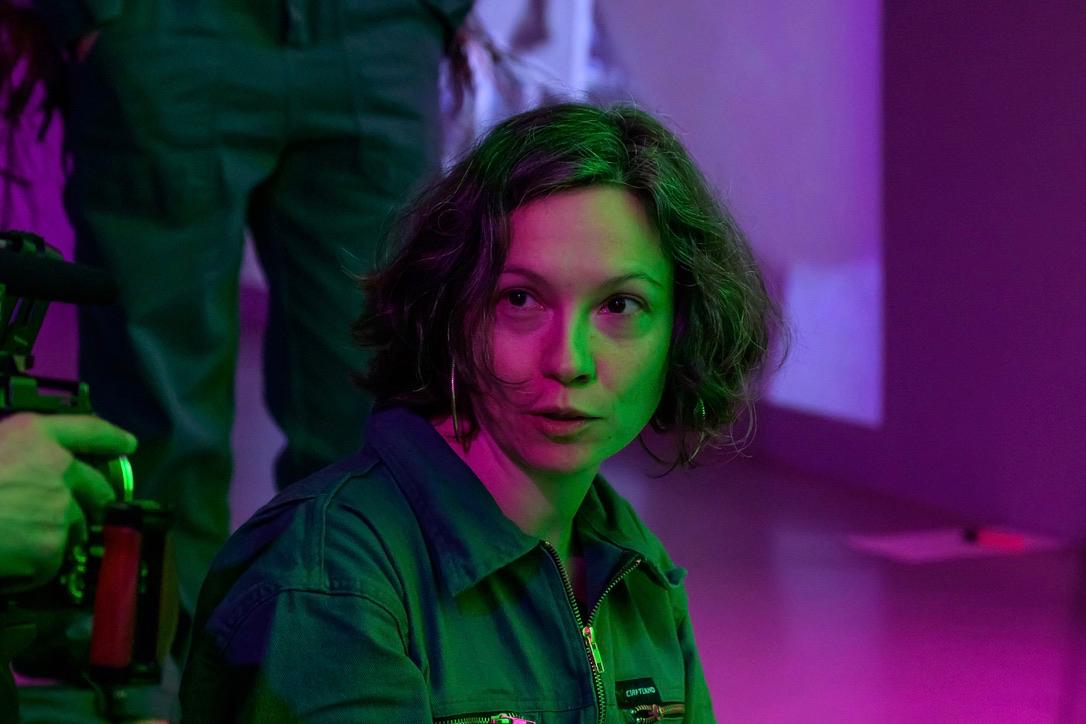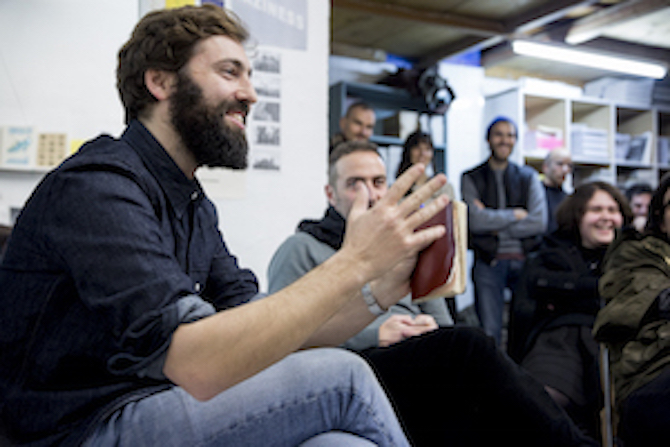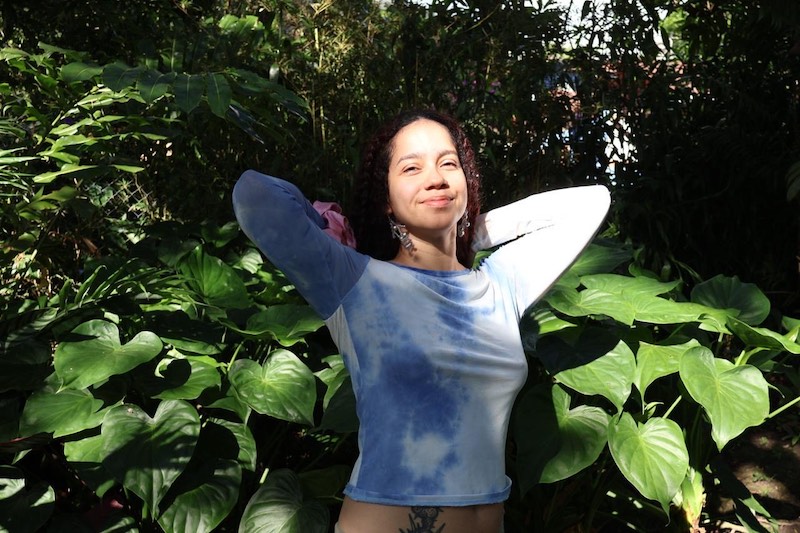Search
To search for an exact match, type the word or phrase you want in quotation marks.
A*DESK has been offering since 2002 contents about criticism and contemporary art. A*DESK has become consolidated thanks to all those who have believed in the project, all those who have followed us, debating, participating and collaborating. Many people have collaborated with A*DESK, and continue to do so. Their efforts, knowledge and belief in the project are what make it grow internationally. At A*DESK we have also generated work for over one hundred professionals in culture, from small collaborations with reviews and classes, to more prolonged and intense collaborations.
At A*DESK we believe in the need for free and universal access to culture and knowledge. We want to carry on being independent, remaining open to more ideas and opinions. If you believe in A*DESK, we need your backing to be able to continue. You can now participate in the project by supporting it. You can choose how much you want to contribute to the project.
You can decide how much you want to bring to the project.

Juan Canela: We live in times in which the possibility of alternative futures has been practically eradicated. In this moment, which seems to lead us inevitably to the memory of destruction, we wonder how to re-approach the concept of utopia from different perspectives and how to incorporate spirituality, magic, rituals, intuition, and speculation. I have the feeling that we are submerged in a sea of impossibility in which we are unable to explore other ways of inhabiting the present in a fuller and more lucid way. Do you think it is possible to imagine new utopias through artistic practices? What form would they take and how could they incorporate all these elements?
Valentina Desideri: The problem with utopia is that it is always in the future. It’s essential to think of utopia outside of this temporal linearity because it’s a trap to think of it as something that has not yet arrived and as an ideal that we can control or determine. If we do X now then Y will happen next. What happens if we relinquish both idealism and control? We could begin to pay attention to what we are doing here and now, to what our practices are producing (or not) in the present, and from there cultivate something different that might perhaps give rise to a different future. The future that is being imposed today is profoundly unimaginative, it’s just more of the same, fascism and colonial expropriation yet again. Everything is encoded in that logic.
Denise Ferreira da Silva identifies sequentiality, linearity, and separability as the three columns of modern thought. These columns are an architecture, a grammar that structures our arguments and that only reproduces violence over and over again. For me, thinking about utopias and practicing a kind of thinking that allows us to try something different involves sabotaging that logic, that grammar. If we could just manage not to repeat that violence we would already be doing something important.
JC: I’m very interested in moving away from the linear notion of time, which is where what I mentioned at the beginning comes in. How can we imagine a utopia that breaks or exceeds the grammars in which we are completely immersed? If we stop understanding time from that modern linear perspective and begin to explore other temporalities, such as those of Indigenous peoples, Afro-descendant communities, Leda María Martins’s spiral time, or Ailton Krenalk’s concept of an ancestral future, then perhaps utopia wouldn’t be something that comes later but rather something that is already happening.
Libertad Rojo: I agree with Valentina. It is in the present that we can transform our definitions of possibility and create a fraction of that ideal future. We can be a part of the destruction of that logic but also contribute to building the bridges that allow what has never come to be to be articulated. In nonlinear time, the future is now, and there is a sense of urgency in the need for artistic, magical, healing, friendly, and poetic ideas to travel across, adventure in, and to enjoy this world.
VD: We could also think of utopia as a practice. That makes a lot of sense now at a time when it seems there’s no future, especially because fascist discourse insists so much on the apocalypse.
JC: And they know how to create it.
VD: Yes, they know very well how to create it. This makes me think of an article by Naomi Klein and Astra Tylor in The Guardian, in which they make a very accurate analysis of how fascism clings to the idea of the apocalypse. It’s literally a cult of the end times. They’ve embraced death as a destiny, and the grand finale in which we all die or a few of us go to Mars is already assumed. The most disturbing thing is that both billionaires and broad sectors of the working class participate in an apocalyptic vision that ends up destroying them all. For Naomi Klein and Astra Tylor, it’s essential to insist that there is a future and to build a broad grassroots movement to affirm it. Those of us who believe in the continuity of life and are willing to work for it must keep insisting, which in itself is a form of resistance against fascism. Art has its role, because insisting, imagining, and creating other possibilities is an art!
If we start from where we are, from what art is now, the site of intervention exists in the creative process itself. That process, even when it occurs alone, is always collaborative. No one creates anything alone. We need other people to produce, think, and do things. So, how do we rethink that process? We need to stop imagining artistic practice as something individual and to rethink the very infrastructure of artistic production and imagine new models and tools for redistribution. Another site of intervention is the work itself, whether it’s an installation, a class, a workshop, a performance or whatever, new forms of sociability and sensibility can be regenerated. Of course, there is an institutional limit and a level of appropriation in the capitalist system that is inevitable. It’s important to be clear about that, to understand the limits and not place our hopes nor too much energy there. I don’t have much faith in institutional art or museums as places in which to imagine another future, but I do have hope in practice, that is, in people’s critical capacity to reorganize the future and to transform the material conditions that make it possible.
JC: So, thinking more in these terms, how do you think artistic practices, including intuition, reading, and being together, can be relevant in this context?
VD: In the Sensing Salon, for example, Denise Ferreira da Silva and I do collective readings with tarot, astrology, and other tools. We use them to address ethical and political questions that we formulate together. These readings don’t seek definitive answers. We always get contradictory readings, first one theory, then another, and then even another. We do it this way intentionally because usually these tools are used to search for certainties, as alternative ways of knowing. In the Sensing Salon, however, the goal isn’t to understand, the goal is to study together, to spend time exploring, questioning, and rehearsing other ways of feeling and making sense. The important thing is the rehearsal, the practice, not the resolution. Another very important thing is that it’s okay not to understand, it’s okay to remain in the unknown. When we do this, we’re all a little confused, but we have each other. We give each other permission not to know for sure. At the same time, we try to understand something about that question. We study with images, with planetary positions, with bodily sensations. Yes, we seek to learn something but we also give ourselves permission not to have answers. In that process, we pay attention to other layers, that is, to intuition, to what we may have forgotten, to what we might remember or imagine. In the end, with or without understanding, something changes.
JC: And how important is community in these practices?
VD: For us, it was always a collective and collaborative thing. From the start, we were already two readers, so authority was already distributed and there wasn’t a single voice. Even the tools (tarot, astrology) are learned from other people. In a way, meaning (and feeling) is made together, in collaboration.
From the beginning, our approach to reading was guided by the question of how to imagine ethics without putting the subject at the center. Usually, someone seeks a reading because they’re in a crisis, because the ways they had of understanding the situation no longer work, and sometimes they need to make difficult decisions. But how do you make decisions without focusing so much on yourself? How do you consider the situation in all its complexity? How do you pay attention to all the elements, people, beings, and conditions that contribute to this situation?
This shifts the focus of the question from a logic of self-help, of individual improvement, to a collective contemplation of what an “ethical” or just action or decision could be. Sometimes, this process completely changes the question. Maybe there isn’t a decision to make, maybe the decision has already been made, and that opens up other possibilities.
LR: Valentina, what tarot cards could accompany us at this moment?
VD: For the past five years, we’ve been developing a tarot deck we call the Echo Tarot Deck. We work both with the mythological figure of Echo and with the material phenomenon of echo and resonance. The deck already exists, although we are still writing the meanings for each card. There is one very important card in the process, which is the equivalent of The Empress, which we call Generosity, because it is about the generative movement of re/de/composition that is existence. It has no end or direction. It’s not about the realization of something in particular, but about infinity, that is, the generous movement of composition that introduces and extracts things from real space and time. This deck is a tool for testing a metaphysics we don’t yet fully understand, a logic of generosity that we need in order to imagine our present and our future.
LR: What contemporary myth do you think urgently needs to be dismantled so that new presents can emerge?
VD: The Ego! I think what we’re trying to do with the Echo Tarot Deck is precisely to dismantle the contemporary myth of the ego, which is why we use the figure of Echo and not Narcissus. In general, even in the Poetry Readings and the Sensing Salon, we’ve developed a form of reading (astrology, tarot, reiki, etc.) that doesn’t focus on the individual or seek to strengthen anyone’s ego or identity. The readings instead focus on our ability to perceive and make sense, collectively and collaboratively, of the situations we face from a more abundant and generous premise, one that does not assume that we are separate and autonomous individuals.

Valentina Desideri explores art making as a form of study and study as a form of making art. She is an artist, researcher and community organizer working internationally across the fields of contemporary art, dance, performance studies, community organizing and social justice.

Juan Canela is chief curator is at the Museo de Arte Contemporáneo de Panamá. He works with artists and other people. He understands curatorial practice as a practice in which ideas, concepts and contents come into play, but also working structures, rhythms, models and ways of life. If it seems that there is no possible future, perhaps from here we can close our eyes and intuit one.

Libertad Rojo (Panama, 1992) is a Panamanian artist interested in the mystical and the communitarian. She is a founding member of the art collective Nuestra (2019), with whom she has developed a working methodology. Her work explores futures, desire and transformation from a poetic and experimental point of view. She has participated in exhibitions such as TrópicoGráficoMágico (2022) and Arcanos Cercanos (2024).
"A desk is a dangerous place from which to watch the world" (John Le Carré)